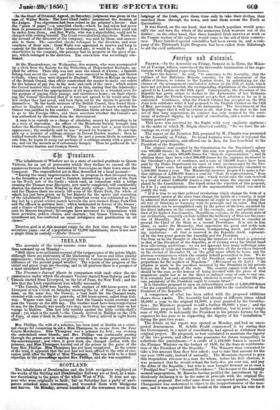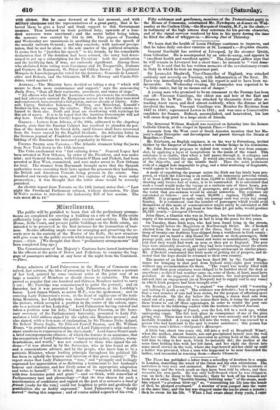itrtign nh CI11111in I.
FaaNea.—In the Assembly on Friday, General de la Hitte, the Minis- ter of Foreign Affairs, announced the favourable termination of the nego- tiations with England _respecting Greece.
"I have the honour,' he said, " to announce to the Assembly, that the Cabinet of her Britannic Majesty consents, for the adjustment of the affairs of Greece, to return to the London treaty, by substituting for the clauses of the arrangement concluded at Athens on the 27th of April, which have not yet been executed, the corresponding stipulations of the convention agreed to m London on the 19th April. Consequently, the President of the Republic has given orders to declare to the Ambassador of her Britannic Majesty, that the French Government accepts that solution as far as it is concerned. Gentlemen, what the French Cabinet has accepted on the 20th June is in substance what it had proposed to the English Cabinet on the 14th of May, previously to the recall of its Ambassador. The Government of the Republic hopes that it will be evident to all, that from the first to the last act of that long negotiation, its conduct was only inspired by the senti- ment of national dignity, by a spirit of conciliation, and a desire of main- taining general peace."
This news was received by the Right with very emphatie applause ; in the midst of which M. Dupin observed audibly, " So we have the ad- vantage on every point."
The report on the Dotation Bill, prepared by M. Flandin was presented to the Assembly on Friday. Its -broad features were that it rejected the Ministerial proposition, and offered one in lieu, far were, beneficial to the President of the Republic. The original sum granted by the Constitution for the President's salary was 600,000 francs • in March 1849 this sum was practically doubled, by the grant of an extra 600,000 francs for " frais de representation" • and in addition there have been voted 200,000 francs for the expenses incidental to the President's place of residence, and a sum of 150,000 francs have been paid by the Home Department for cases of want recommended by the Pre- sident. These sums had made an allowance which practically amounted to 1,550,000 francs a year. The Ministerial measure proposed to make a fur- ther addition of 2,400,000 francs a year for " frais de representation," from the let of January in the present year ; which would raise the sum received to a total of about 3,600,000 franca a year—six times the amount contem- plated by the Constitution. The report states the rejection of this proposal, by 9 to 5; and recapitulates some of the argumentation which was used to justify the Tote.
"If it is true to say that political revolutions which change the form of a government cannot at the same time change the habits of a country, it must be admitted that under a new government all ought to concur in placing the old way of thinking in harmony with its principle and its rules. But that modification can be accomplished only by the power of the laws, seconded by the direct influence on the country of the example, acts, and political con- duct of its highest functionaries. Republican customs, in the present state Of our civilization assuredly exclude neither the brilliancy of fetes nor the exere rise of liberality. But it is to fall into an exaggeration to consider at present the Chief of the state as a second Providence. It is not to him alone, as under the Monarchy, that appertains the great and noble task of encouraging the arts and sciences, recompensing merit, and alleviat- ing misfortune : all that is reserved to the Republic itself, represent-
ed by the two great powers the Assembly and the President Far from us be the thought of checking the impulses of a heart 80 generous as that of the President of the Republic, or of turning away his liberal hand from alleviating misfortune : we are not ignorant how many sufferings arise in moments of crisis and transition • we appreciate all the sacrifices imposed on the elected of December 10, on 'the great name which he bears, and the glorious reminiscences which the country beheld personified in him. We do not mean to deny that the salary of the President ought to assume larger proportions for the nephew of Napoleon." (Movement on the Left.) An allusion is made to the sacrifices incurred by the President in his private fortune for the benefit of the state. The country cannot wish that such should be the ease, as the honour of being invested with the .place of first magistrate ought not to be the direct or indirect cause of ruin to any one. It is _certainly just and constitutional, whatever is resolved on, that the pri- vate patrimony of the President ought to remain intact."
It is therefore proposed to open an extraordinary credit of 1,600,000 Mines "for the expenditures incurred in 1849 and 1850 for the installation of the President of the Republic."
A comparison of what has been added with the proposed additions shows these results. The Assembly had already at different times added 38,000/. a year to the original 24,0001. a year granted by the Constitu- tion; the Ministers proposed to add a further 96,000/. a year ; and the Committee proposed to make no further addition, but to grant a single sum of 64,0004 to indemnify the President in his private fortune for the expenses he has gone to in supporting the dignity of his "installation" during the past two years. The debate on the report was opened on Monday, and had an unex- pected denouement. M. Achille Fould commenced it by stating that the Goveniment, in a spirit of conciliation, had agreed to withdraw their original project. He proposed, as best calculated to maintain the dignity of the two powers, and afford some guarantee for future tranquillity, to substitute this amendment—" A credit of 2,160,000 francs is opened to the Finance Minister on the budget of 1850, for the fntis de representa- tion of the President Of the Republic." The Ministry thus consented to take a less' amountthan they first asked ; and to take that amount for the one year 1850 only, inatead of annually. The Mountain objected to give this stupendous revenue to a man for whom, before his first election, it was promised that he would refund the forty-five per cent tax, and pay the debts of the Republic ; but who is now brought forward as at once- a ", Prodigal Son" and a 44 Seeend Providence." The temper of the Assembly seeitiealunpropttious, M. Brooch° having perilled the amendment by rim clieulously declaring it to be the same in principle with the original Go. vet/anent proposal. But relief came from an unexpected quarter. General Changarruer was understood to object to the inopportuneness of the mea- sure, and it was expected that he would at the utmost give his vote for it
With silence. But he came forward at the last moment, and with Military sharpness told the representatives of a great party, that it be- hoved them to give a loyal and frank support to this Government measure. Thus lectured on their political duty, upwards of a hun- dred waverers were convinced; and the secret ballot being taken, the measure was carried by 354 to 308. The papers of Tuesday and Wednesday are unanimous in ascribing the result to the speech of the usually taciturn General ; and they conclude, with national precipi- tation, that he and he alone is the sole master of the political situation. It seems that he "justifies his speech" to his friends, by the remarkable declaration that if the dotation had been refused, the army had deter- mined to get up a subscription for the President both the justification and the justifying fact, if true, are curiously significant. Among those who abstained from voting were Cavaignac and De Tocqueville Dufaure and Gustave de Beaumont, St. Priest and Offilon Barret: the Lcgitinnst Marquis de Larochejacquelin voted for the dotation ; Generals de Lemon- ciere and Bedeau, and the Orleanists MM. de Mornay and Cunin-Gri- daine, voted against it.
' Aurram.—The Ministry have decided on taking a s "which will ?enure to them more countenance and support," says the announcing Daily News, "than all their regiments, governors, and states of siege."
"All officers who had left the Austrian service previous to the revo ution, and had afterwards entered the Hungarian service for which they were tried and condemned, have received a full pardon, and are already at liberty. Colo- nels Liptay, Szekulies Rahonczy, Weldberg, and Masselengi, ossuth' brother-in-law, are among the number. They are to have their estates re- turned to them also. Pesth and Arad are overflowing with rejoicings for this act of mercy. It is to be hoped that the Austrian Government will not stop here. Count Stephen Carolyi hopes to obtain his freedom."
GREECE.—Letters from Athens, of the 10th, addressed to the Augsburg Gazette, state that the Russian Cabinet has resolved to abandon its por- tion of the interest on the Greek debt, until Greece shall have recovered from the losses caused by the English blockade. An Athenian letter in the German journal of Frankfort corroborates the report of this obvious bidding of the Russians for increased popularity in Greece.
UNITED STATES AND CANADA.—The Atlantic steamers bring the:news from New York down to the 15th instant.
The Cuba excitement was "fast calming down." General Lopez had been arrested at New Orleans, by order of the President, and was under trial; and General Gonzales, with Colonels O'Hara and Pickett, had been arrested at Key West, committed, and sent under arrest to New Orleans fbr trial. The steamer from Havannah brought news that the Spanish authorities were executing their laws against the prisoners they had taken, the British and American Consuls being present in the courts. One hundred and twenty-three men, and two captains of ships, were under prosecution ; it was thought that the Latter alone would be severely punished.
An electric report from Toronto on the 12th instant states that—" Last night the Provincial Parliament refused, without discussion, Sir Alan 31'h/eh's motion to introduce the Indemnity Bill of last session. The vote snood 36 to 16."



























 Previous page
Previous page